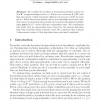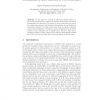FSTTCS
2004
Springer
13 years 8 months ago
2004
Springer
A separation context is a client program which does not dereference internals of a module with which it interacts. We use certain "precise" relations to unambiguously des...
FSTTCS
2004
Springer
13 years 10 months ago
2004
Springer
FSTTCS
2004
Springer
13 years 10 months ago
2004
Springer
FSTTCS
2004
Springer
13 years 10 months ago
2004
Springer
Abstract. Conventional semantics for shared-variable concurrency suffers from the “grain of time” problem, i.e., the necessity of specifying a default level of atomicity. We pr...
FSTTCS
2004
Springer
13 years 10 months ago
2004
Springer
We consider the problem of determining whether a given set S in Rn is approximately convex, i.e., if there is a convex set K ∈ Rn such that the volume of their symmetric differe...
FSTTCS
2004
Springer
13 years 10 months ago
2004
Springer
Abstract. We present fast distributed algorithms for coloring and (connected) dominating set construction in wireless ad hoc networks. We present our algorithms in the context of U...
FSTTCS
2004
Springer
13 years 10 months ago
2004
Springer
In this paper we provide an automaton-based solution to the decision problem for a large set of monadic second-order theories of deterministic tree structures. We achieve it in two...
FSTTCS
2004
Springer
13 years 10 months ago
2004
Springer
The class of visibly pushdown languages has been recently defined as a subclass of context-free languages with desirable closure properties and tractable decision problems. We stu...
FSTTCS
2004
Springer
13 years 10 months ago
2004
Springer
A self-stabilizing distributed protocol can recover from any state-corrupting fault. A self-stabilizing protocol is called adaptive if its recovery time is proportional to the numb...
FSTTCS
2004
Springer
13 years 10 months ago
2004
Springer
A computational model for learning languages in the limit from full positive data and a bounded number of queries to the teacher (oracle) is introduced and explored. Equivalence, ...



